Regent College Entrepreneurship and Small Business Assignment Report
VerifiedAdded on 2020/01/28
|21
|6615
|294
Report
AI Summary
This report, prepared for a HND Business course, delves into the multifaceted world of entrepreneurship and small business management. It begins by examining the range of entrepreneurial ventures, categorizing them, and exploring their relationship to the typology of entrepreneurship. The report then assesses the significant impact of micro and small businesses on the economy, particularly in the context of post-Brexit social economies, highlighting their role in job creation and economic growth. Furthermore, the report conducts mini-research to identify the characteristics, traits, and skills that distinguish successful entrepreneurs from other business managers, analyzing aspects of the entrepreneurial personality and mindset. Finally, it explores how different environments, personal backgrounds, and experiences can either foster or hinder entrepreneurial endeavors, providing practical examples to illustrate these concepts. The report utilizes figures and diagrams to explain complex concepts and provides a comprehensive overview of entrepreneurship. It covers topics such as the entrepreneurial process, venture types, corporate entrepreneurship, social entrepreneurship, and the factors influencing small business success. It is a comprehensive analysis that provides a solid foundation in the principles of entrepreneurship and its application in the real world.

Entrepreneurship and Small Business Management
UNIT 9
Page 1 of 21
UNIT 9
Page 1 of 21
Paraphrase This Document
Need a fresh take? Get an instant paraphrase of this document with our AI Paraphraser
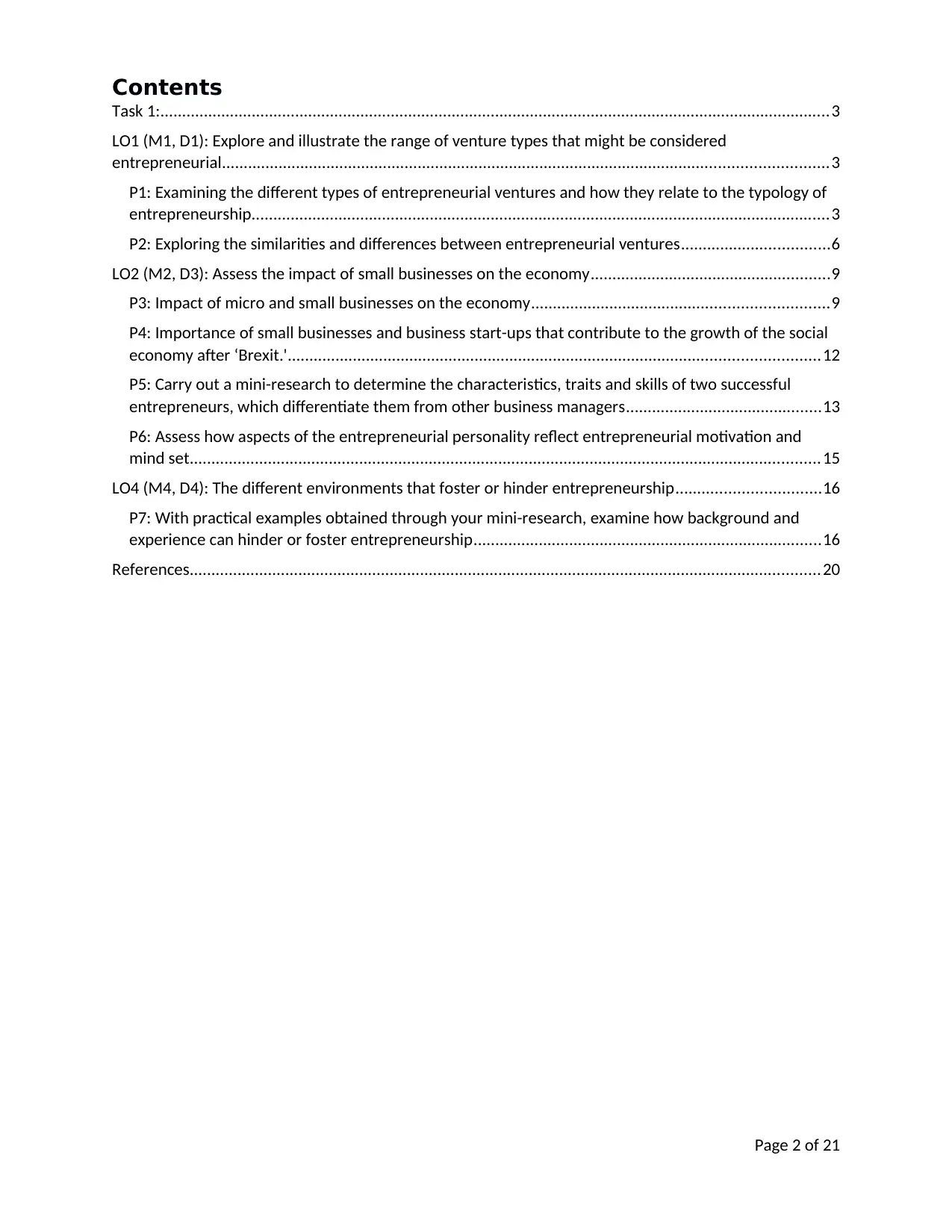
Contents
Task 1:..........................................................................................................................................................3
LO1 (M1, D1): Explore and illustrate the range of venture types that might be considered
entrepreneurial...........................................................................................................................................3
P1: Examining the different types of entrepreneurial ventures and how they relate to the typology of
entrepreneurship.....................................................................................................................................3
P2: Exploring the similarities and differences between entrepreneurial ventures..................................6
LO2 (M2, D3): Assess the impact of small businesses on the economy.......................................................9
P3: Impact of micro and small businesses on the economy....................................................................9
P4: Importance of small businesses and business start-ups that contribute to the growth of the social
economy after ‘Brexit.'..........................................................................................................................12
P5: Carry out a mini-research to determine the characteristics, traits and skills of two successful
entrepreneurs, which differentiate them from other business managers.............................................13
P6: Assess how aspects of the entrepreneurial personality reflect entrepreneurial motivation and
mind set.................................................................................................................................................15
LO4 (M4, D4): The different environments that foster or hinder entrepreneurship.................................16
P7: With practical examples obtained through your mini-research, examine how background and
experience can hinder or foster entrepreneurship................................................................................16
References.................................................................................................................................................20
Page 2 of 21
Task 1:..........................................................................................................................................................3
LO1 (M1, D1): Explore and illustrate the range of venture types that might be considered
entrepreneurial...........................................................................................................................................3
P1: Examining the different types of entrepreneurial ventures and how they relate to the typology of
entrepreneurship.....................................................................................................................................3
P2: Exploring the similarities and differences between entrepreneurial ventures..................................6
LO2 (M2, D3): Assess the impact of small businesses on the economy.......................................................9
P3: Impact of micro and small businesses on the economy....................................................................9
P4: Importance of small businesses and business start-ups that contribute to the growth of the social
economy after ‘Brexit.'..........................................................................................................................12
P5: Carry out a mini-research to determine the characteristics, traits and skills of two successful
entrepreneurs, which differentiate them from other business managers.............................................13
P6: Assess how aspects of the entrepreneurial personality reflect entrepreneurial motivation and
mind set.................................................................................................................................................15
LO4 (M4, D4): The different environments that foster or hinder entrepreneurship.................................16
P7: With practical examples obtained through your mini-research, examine how background and
experience can hinder or foster entrepreneurship................................................................................16
References.................................................................................................................................................20
Page 2 of 21
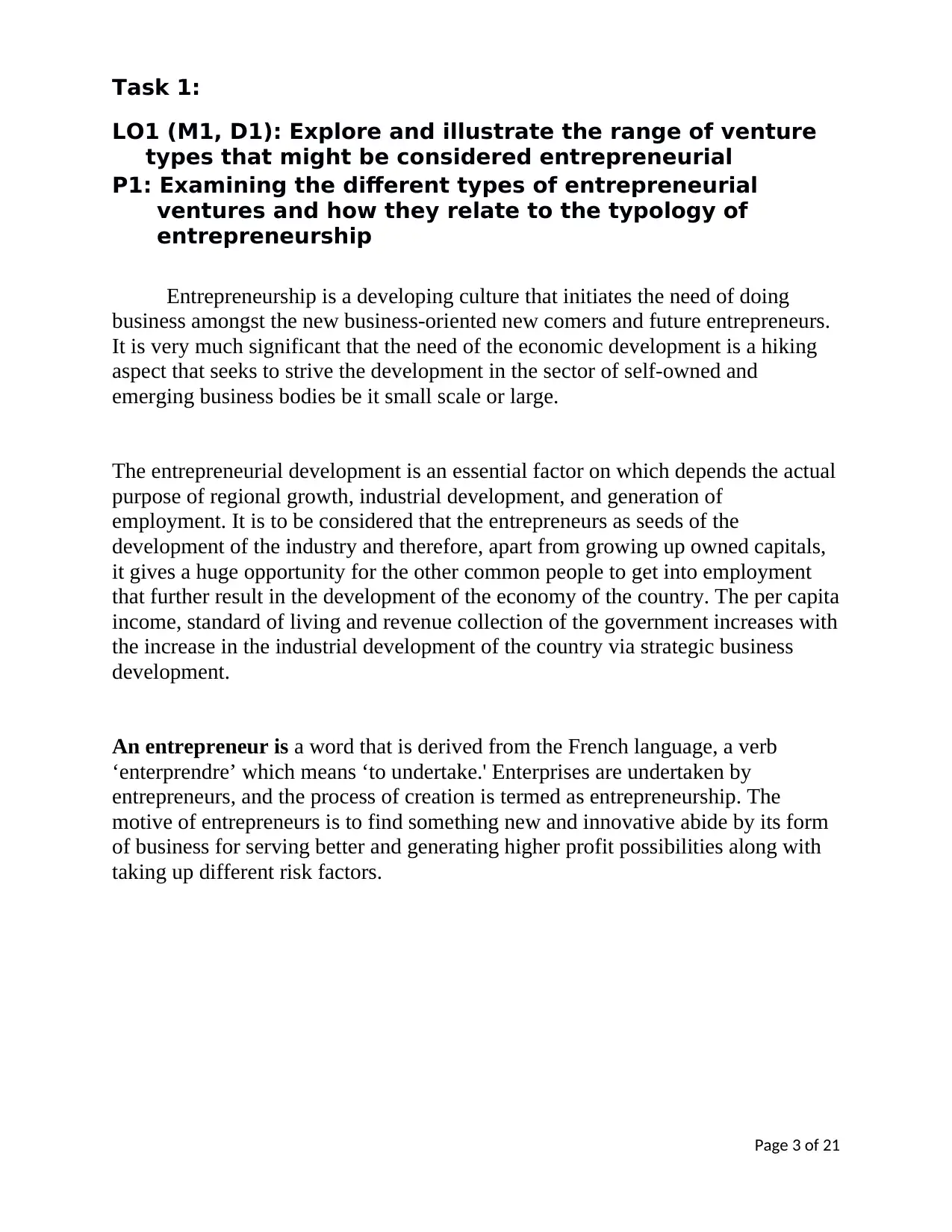
Task 1:
LO1 (M1, D1): Explore and illustrate the range of venture
types that might be considered entrepreneurial
P1: Examining the different types of entrepreneurial
ventures and how they relate to the typology of
entrepreneurship
Entrepreneurship is a developing culture that initiates the need of doing
business amongst the new business-oriented new comers and future entrepreneurs.
It is very much significant that the need of the economic development is a hiking
aspect that seeks to strive the development in the sector of self-owned and
emerging business bodies be it small scale or large.
The entrepreneurial development is an essential factor on which depends the actual
purpose of regional growth, industrial development, and generation of
employment. It is to be considered that the entrepreneurs as seeds of the
development of the industry and therefore, apart from growing up owned capitals,
it gives a huge opportunity for the other common people to get into employment
that further result in the development of the economy of the country. The per capita
income, standard of living and revenue collection of the government increases with
the increase in the industrial development of the country via strategic business
development.
An entrepreneur is a word that is derived from the French language, a verb
‘enterprendre’ which means ‘to undertake.' Enterprises are undertaken by
entrepreneurs, and the process of creation is termed as entrepreneurship. The
motive of entrepreneurs is to find something new and innovative abide by its form
of business for serving better and generating higher profit possibilities along with
taking up different risk factors.
Page 3 of 21
LO1 (M1, D1): Explore and illustrate the range of venture
types that might be considered entrepreneurial
P1: Examining the different types of entrepreneurial
ventures and how they relate to the typology of
entrepreneurship
Entrepreneurship is a developing culture that initiates the need of doing
business amongst the new business-oriented new comers and future entrepreneurs.
It is very much significant that the need of the economic development is a hiking
aspect that seeks to strive the development in the sector of self-owned and
emerging business bodies be it small scale or large.
The entrepreneurial development is an essential factor on which depends the actual
purpose of regional growth, industrial development, and generation of
employment. It is to be considered that the entrepreneurs as seeds of the
development of the industry and therefore, apart from growing up owned capitals,
it gives a huge opportunity for the other common people to get into employment
that further result in the development of the economy of the country. The per capita
income, standard of living and revenue collection of the government increases with
the increase in the industrial development of the country via strategic business
development.
An entrepreneur is a word that is derived from the French language, a verb
‘enterprendre’ which means ‘to undertake.' Enterprises are undertaken by
entrepreneurs, and the process of creation is termed as entrepreneurship. The
motive of entrepreneurs is to find something new and innovative abide by its form
of business for serving better and generating higher profit possibilities along with
taking up different risk factors.
Page 3 of 21
⊘ This is a preview!⊘
Do you want full access?
Subscribe today to unlock all pages.

Trusted by 1+ million students worldwide
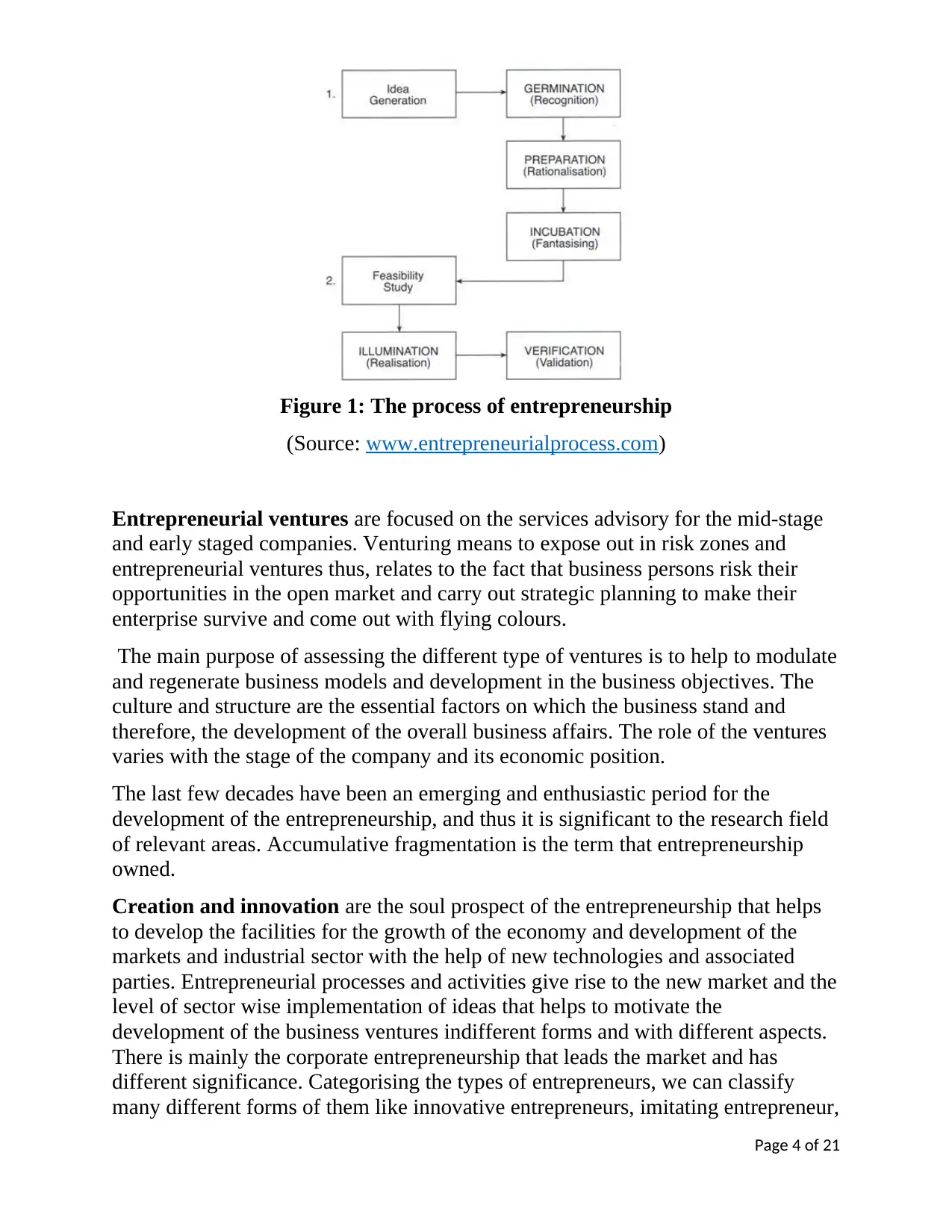
Figure 1: The process of entrepreneurship
(Source: www.entrepreneurialprocess.com)
Entrepreneurial ventures are focused on the services advisory for the mid-stage
and early staged companies. Venturing means to expose out in risk zones and
entrepreneurial ventures thus, relates to the fact that business persons risk their
opportunities in the open market and carry out strategic planning to make their
enterprise survive and come out with flying colours.
The main purpose of assessing the different type of ventures is to help to modulate
and regenerate business models and development in the business objectives. The
culture and structure are the essential factors on which the business stand and
therefore, the development of the overall business affairs. The role of the ventures
varies with the stage of the company and its economic position.
The last few decades have been an emerging and enthusiastic period for the
development of the entrepreneurship, and thus it is significant to the research field
of relevant areas. Accumulative fragmentation is the term that entrepreneurship
owned.
Creation and innovation are the soul prospect of the entrepreneurship that helps
to develop the facilities for the growth of the economy and development of the
markets and industrial sector with the help of new technologies and associated
parties. Entrepreneurial processes and activities give rise to the new market and the
level of sector wise implementation of ideas that helps to motivate the
development of the business ventures indifferent forms and with different aspects.
There is mainly the corporate entrepreneurship that leads the market and has
different significance. Categorising the types of entrepreneurs, we can classify
many different forms of them like innovative entrepreneurs, imitating entrepreneur,
Page 4 of 21
(Source: www.entrepreneurialprocess.com)
Entrepreneurial ventures are focused on the services advisory for the mid-stage
and early staged companies. Venturing means to expose out in risk zones and
entrepreneurial ventures thus, relates to the fact that business persons risk their
opportunities in the open market and carry out strategic planning to make their
enterprise survive and come out with flying colours.
The main purpose of assessing the different type of ventures is to help to modulate
and regenerate business models and development in the business objectives. The
culture and structure are the essential factors on which the business stand and
therefore, the development of the overall business affairs. The role of the ventures
varies with the stage of the company and its economic position.
The last few decades have been an emerging and enthusiastic period for the
development of the entrepreneurship, and thus it is significant to the research field
of relevant areas. Accumulative fragmentation is the term that entrepreneurship
owned.
Creation and innovation are the soul prospect of the entrepreneurship that helps
to develop the facilities for the growth of the economy and development of the
markets and industrial sector with the help of new technologies and associated
parties. Entrepreneurial processes and activities give rise to the new market and the
level of sector wise implementation of ideas that helps to motivate the
development of the business ventures indifferent forms and with different aspects.
There is mainly the corporate entrepreneurship that leads the market and has
different significance. Categorising the types of entrepreneurs, we can classify
many different forms of them like innovative entrepreneurs, imitating entrepreneur,
Page 4 of 21
Paraphrase This Document
Need a fresh take? Get an instant paraphrase of this document with our AI Paraphraser
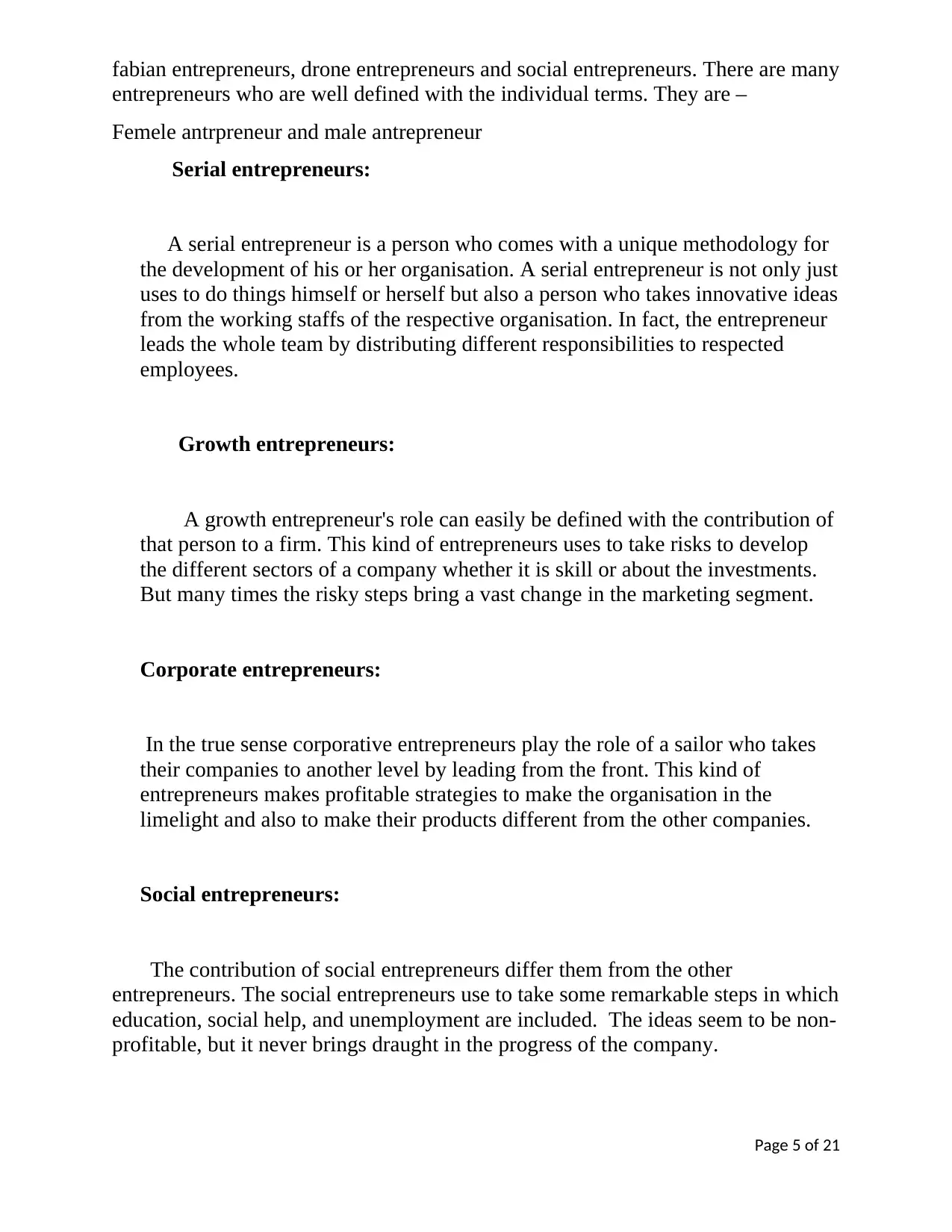
fabian entrepreneurs, drone entrepreneurs and social entrepreneurs. There are many
entrepreneurs who are well defined with the individual terms. They are –
Femele antrpreneur and male antrepreneur
Serial entrepreneurs:
A serial entrepreneur is a person who comes with a unique methodology for
the development of his or her organisation. A serial entrepreneur is not only just
uses to do things himself or herself but also a person who takes innovative ideas
from the working staffs of the respective organisation. In fact, the entrepreneur
leads the whole team by distributing different responsibilities to respected
employees.
Growth entrepreneurs:
A growth entrepreneur's role can easily be defined with the contribution of
that person to a firm. This kind of entrepreneurs uses to take risks to develop
the different sectors of a company whether it is skill or about the investments.
But many times the risky steps bring a vast change in the marketing segment.
Corporate entrepreneurs:
In the true sense corporative entrepreneurs play the role of a sailor who takes
their companies to another level by leading from the front. This kind of
entrepreneurs makes profitable strategies to make the organisation in the
limelight and also to make their products different from the other companies.
Social entrepreneurs:
The contribution of social entrepreneurs differ them from the other
entrepreneurs. The social entrepreneurs use to take some remarkable steps in which
education, social help, and unemployment are included. The ideas seem to be non-
profitable, but it never brings draught in the progress of the company.
Page 5 of 21
entrepreneurs who are well defined with the individual terms. They are –
Femele antrpreneur and male antrepreneur
Serial entrepreneurs:
A serial entrepreneur is a person who comes with a unique methodology for
the development of his or her organisation. A serial entrepreneur is not only just
uses to do things himself or herself but also a person who takes innovative ideas
from the working staffs of the respective organisation. In fact, the entrepreneur
leads the whole team by distributing different responsibilities to respected
employees.
Growth entrepreneurs:
A growth entrepreneur's role can easily be defined with the contribution of
that person to a firm. This kind of entrepreneurs uses to take risks to develop
the different sectors of a company whether it is skill or about the investments.
But many times the risky steps bring a vast change in the marketing segment.
Corporate entrepreneurs:
In the true sense corporative entrepreneurs play the role of a sailor who takes
their companies to another level by leading from the front. This kind of
entrepreneurs makes profitable strategies to make the organisation in the
limelight and also to make their products different from the other companies.
Social entrepreneurs:
The contribution of social entrepreneurs differ them from the other
entrepreneurs. The social entrepreneurs use to take some remarkable steps in which
education, social help, and unemployment are included. The ideas seem to be non-
profitable, but it never brings draught in the progress of the company.
Page 5 of 21
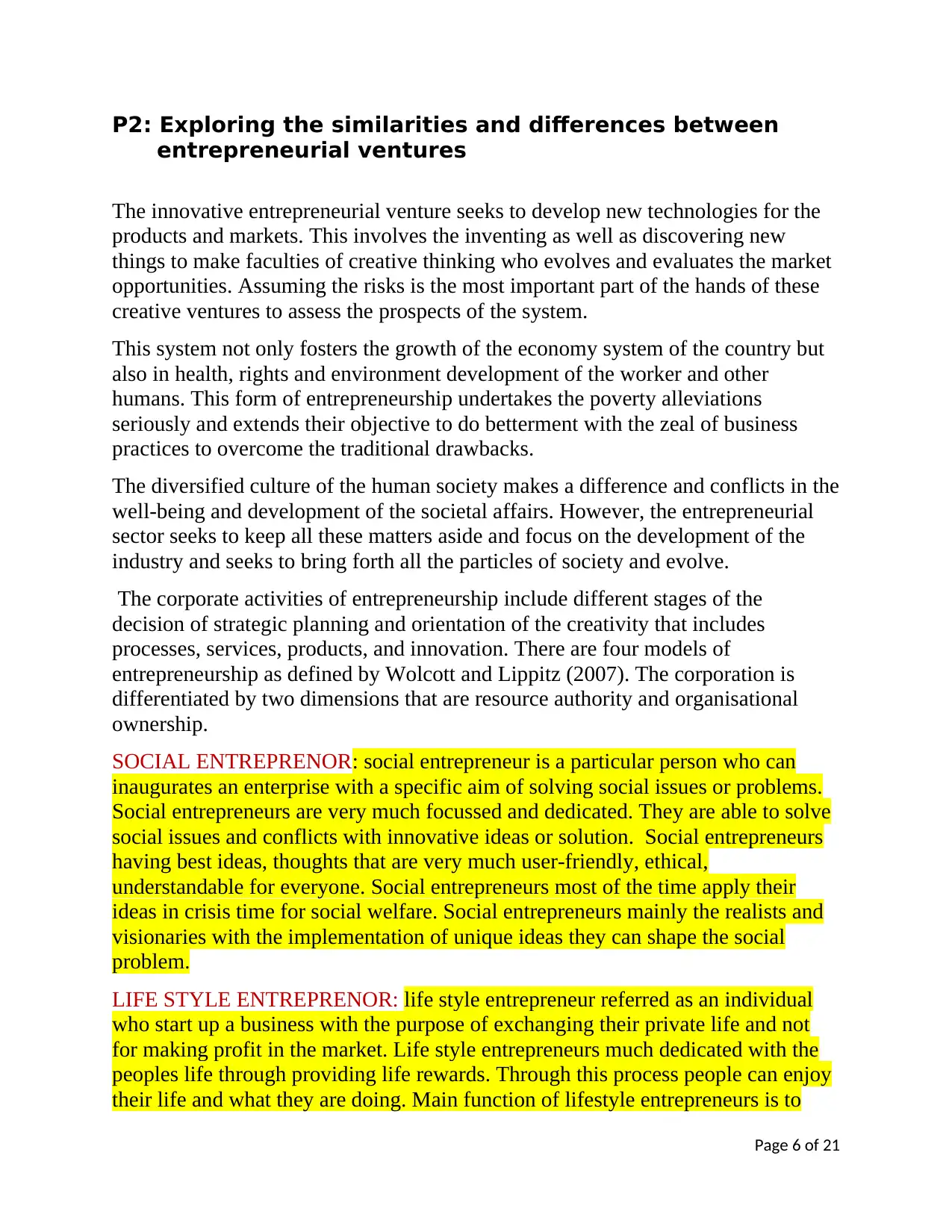
P2: Exploring the similarities and differences between
entrepreneurial ventures
The innovative entrepreneurial venture seeks to develop new technologies for the
products and markets. This involves the inventing as well as discovering new
things to make faculties of creative thinking who evolves and evaluates the market
opportunities. Assuming the risks is the most important part of the hands of these
creative ventures to assess the prospects of the system.
This system not only fosters the growth of the economy system of the country but
also in health, rights and environment development of the worker and other
humans. This form of entrepreneurship undertakes the poverty alleviations
seriously and extends their objective to do betterment with the zeal of business
practices to overcome the traditional drawbacks.
The diversified culture of the human society makes a difference and conflicts in the
well-being and development of the societal affairs. However, the entrepreneurial
sector seeks to keep all these matters aside and focus on the development of the
industry and seeks to bring forth all the particles of society and evolve.
The corporate activities of entrepreneurship include different stages of the
decision of strategic planning and orientation of the creativity that includes
processes, services, products, and innovation. There are four models of
entrepreneurship as defined by Wolcott and Lippitz (2007). The corporation is
differentiated by two dimensions that are resource authority and organisational
ownership.
SOCIAL ENTREPRENOR: social entrepreneur is a particular person who can
inaugurates an enterprise with a specific aim of solving social issues or problems.
Social entrepreneurs are very much focussed and dedicated. They are able to solve
social issues and conflicts with innovative ideas or solution. Social entrepreneurs
having best ideas, thoughts that are very much user-friendly, ethical,
understandable for everyone. Social entrepreneurs most of the time apply their
ideas in crisis time for social welfare. Social entrepreneurs mainly the realists and
visionaries with the implementation of unique ideas they can shape the social
problem.
LIFE STYLE ENTREPRENOR: life style entrepreneur referred as an individual
who start up a business with the purpose of exchanging their private life and not
for making profit in the market. Life style entrepreneurs much dedicated with the
peoples life through providing life rewards. Through this process people can enjoy
their life and what they are doing. Main function of lifestyle entrepreneurs is to
Page 6 of 21
entrepreneurial ventures
The innovative entrepreneurial venture seeks to develop new technologies for the
products and markets. This involves the inventing as well as discovering new
things to make faculties of creative thinking who evolves and evaluates the market
opportunities. Assuming the risks is the most important part of the hands of these
creative ventures to assess the prospects of the system.
This system not only fosters the growth of the economy system of the country but
also in health, rights and environment development of the worker and other
humans. This form of entrepreneurship undertakes the poverty alleviations
seriously and extends their objective to do betterment with the zeal of business
practices to overcome the traditional drawbacks.
The diversified culture of the human society makes a difference and conflicts in the
well-being and development of the societal affairs. However, the entrepreneurial
sector seeks to keep all these matters aside and focus on the development of the
industry and seeks to bring forth all the particles of society and evolve.
The corporate activities of entrepreneurship include different stages of the
decision of strategic planning and orientation of the creativity that includes
processes, services, products, and innovation. There are four models of
entrepreneurship as defined by Wolcott and Lippitz (2007). The corporation is
differentiated by two dimensions that are resource authority and organisational
ownership.
SOCIAL ENTREPRENOR: social entrepreneur is a particular person who can
inaugurates an enterprise with a specific aim of solving social issues or problems.
Social entrepreneurs are very much focussed and dedicated. They are able to solve
social issues and conflicts with innovative ideas or solution. Social entrepreneurs
having best ideas, thoughts that are very much user-friendly, ethical,
understandable for everyone. Social entrepreneurs most of the time apply their
ideas in crisis time for social welfare. Social entrepreneurs mainly the realists and
visionaries with the implementation of unique ideas they can shape the social
problem.
LIFE STYLE ENTREPRENOR: life style entrepreneur referred as an individual
who start up a business with the purpose of exchanging their private life and not
for making profit in the market. Life style entrepreneurs much dedicated with the
peoples life through providing life rewards. Through this process people can enjoy
their life and what they are doing. Main function of lifestyle entrepreneurs is to
Page 6 of 21
⊘ This is a preview!⊘
Do you want full access?
Subscribe today to unlock all pages.

Trusted by 1+ million students worldwide

turning the individual’s interest and passions into the productivity and services.by
turning their interest and passion on product and services individual can serve
others and take care of their way of life’s liberty and prospects.
The serial entrepreneurs use to set up something quite different businesses. Their
concept keeps them totally apart from the other business. In this regard, it can be
said that in the very beginning Orkut was the company who captured the throne of
business regarding social networking. But its era comes to an end with the
devastating entry of Facebook. Facebook, is not that company which captured the
market instantly. The founders of this social site are a group of students of Harvard
University. But the main man behind this is Mark Zuckerberg. Their assignment
relating this site was not accepted at first. But later it casts an impact in the whole
world with its innovative idea and usage.
On the other hand, LanaiBLO hair dryer is a serial entrepreneur product. The
whole world knows the name of Phillips as one of the best hair dryers, but now-a-
days LanaiBLO hair dryer has also captured the market.
Figure 2:
LanaiBLO hair
dryer
(Source-
https://amymakeup.info/lanaiblo-hair-dryer-a-game-changer-press-release/)
This was not well known to the people, but in the present time many Hollywood
celebrities are using and doing the advertisement for this product. A serial
entrepreneurship comes from the zero to top place. This happens because of the
quality and trust.
Page 7 of 21
turning their interest and passion on product and services individual can serve
others and take care of their way of life’s liberty and prospects.
The serial entrepreneurs use to set up something quite different businesses. Their
concept keeps them totally apart from the other business. In this regard, it can be
said that in the very beginning Orkut was the company who captured the throne of
business regarding social networking. But its era comes to an end with the
devastating entry of Facebook. Facebook, is not that company which captured the
market instantly. The founders of this social site are a group of students of Harvard
University. But the main man behind this is Mark Zuckerberg. Their assignment
relating this site was not accepted at first. But later it casts an impact in the whole
world with its innovative idea and usage.
On the other hand, LanaiBLO hair dryer is a serial entrepreneur product. The
whole world knows the name of Phillips as one of the best hair dryers, but now-a-
days LanaiBLO hair dryer has also captured the market.
Figure 2:
LanaiBLO hair
dryer
(Source-
https://amymakeup.info/lanaiblo-hair-dryer-a-game-changer-press-release/)
This was not well known to the people, but in the present time many Hollywood
celebrities are using and doing the advertisement for this product. A serial
entrepreneurship comes from the zero to top place. This happens because of the
quality and trust.
Page 7 of 21
Paraphrase This Document
Need a fresh take? Get an instant paraphrase of this document with our AI Paraphraser
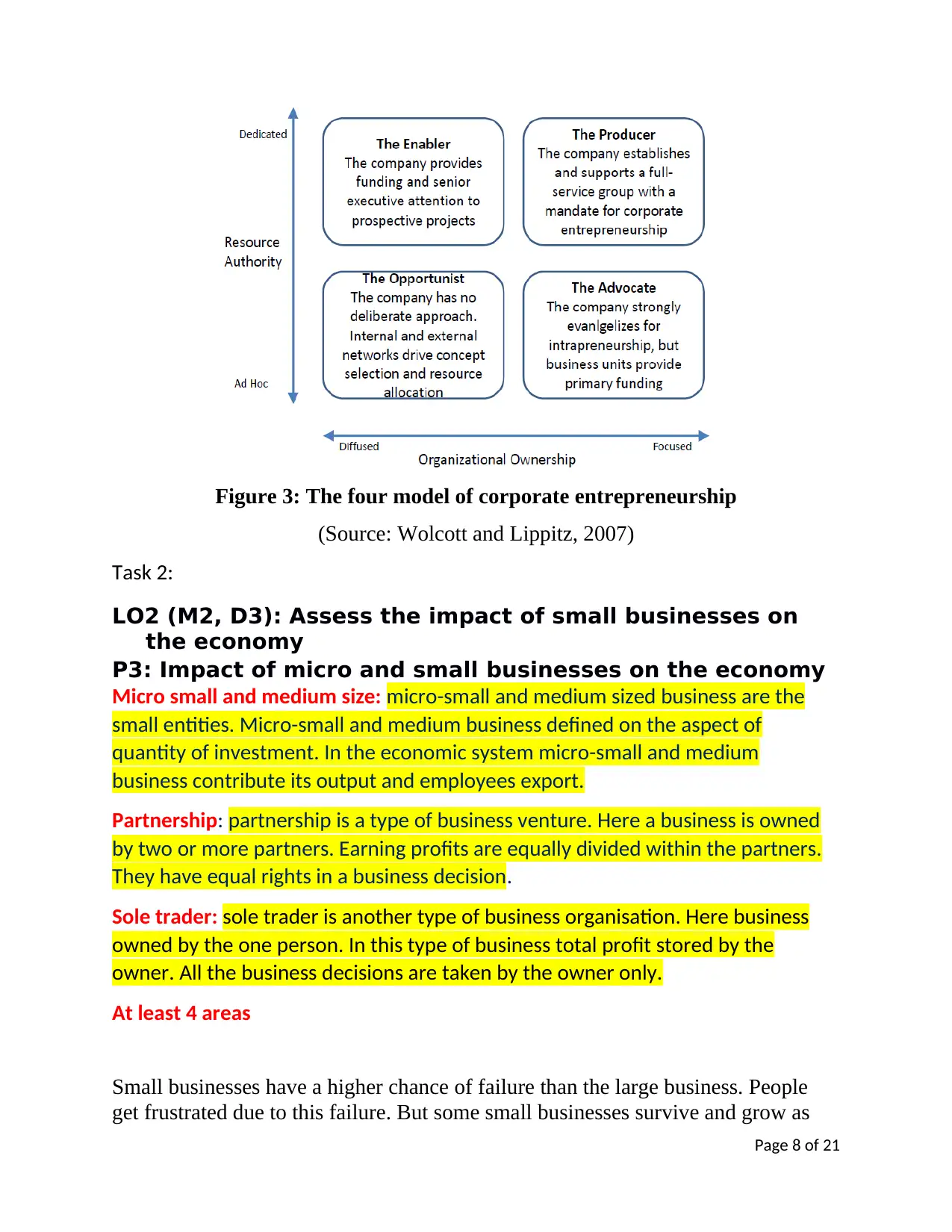
Figure 3: The four model of corporate entrepreneurship
(Source: Wolcott and Lippitz, 2007)
Task 2:
LO2 (M2, D3): Assess the impact of small businesses on
the economy
P3: Impact of micro and small businesses on the economy
Micro small and medium size: micro-small and medium sized business are the
small entities. Micro-small and medium business defined on the aspect of
quantity of investment. In the economic system micro-small and medium
business contribute its output and employees export.
Partnership: partnership is a type of business venture. Here a business is owned
by two or more partners. Earning profits are equally divided within the partners.
They have equal rights in a business decision.
Sole trader: sole trader is another type of business organisation. Here business
owned by the one person. In this type of business total profit stored by the
owner. All the business decisions are taken by the owner only.
At least 4 areas
Small businesses have a higher chance of failure than the large business. People
get frustrated due to this failure. But some small businesses survive and grow as
Page 8 of 21
(Source: Wolcott and Lippitz, 2007)
Task 2:
LO2 (M2, D3): Assess the impact of small businesses on
the economy
P3: Impact of micro and small businesses on the economy
Micro small and medium size: micro-small and medium sized business are the
small entities. Micro-small and medium business defined on the aspect of
quantity of investment. In the economic system micro-small and medium
business contribute its output and employees export.
Partnership: partnership is a type of business venture. Here a business is owned
by two or more partners. Earning profits are equally divided within the partners.
They have equal rights in a business decision.
Sole trader: sole trader is another type of business organisation. Here business
owned by the one person. In this type of business total profit stored by the
owner. All the business decisions are taken by the owner only.
At least 4 areas
Small businesses have a higher chance of failure than the large business. People
get frustrated due to this failure. But some small businesses survive and grow as
Page 8 of 21
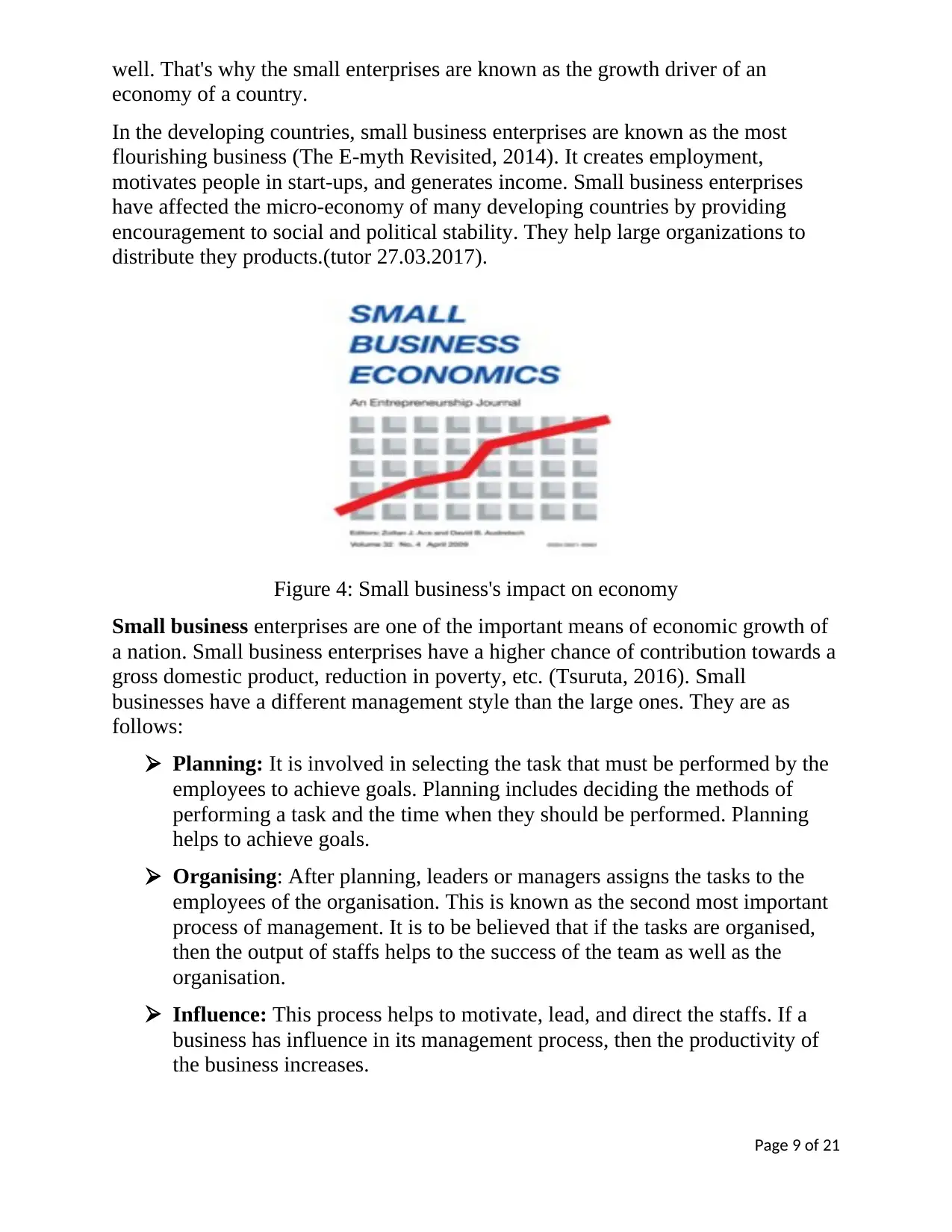
well. That's why the small enterprises are known as the growth driver of an
economy of a country.
In the developing countries, small business enterprises are known as the most
flourishing business (The E-myth Revisited, 2014). It creates employment,
motivates people in start-ups, and generates income. Small business enterprises
have affected the micro-economy of many developing countries by providing
encouragement to social and political stability. They help large organizations to
distribute they products.(tutor 27.03.2017).
Figure 4: Small business's impact on economy
Small business enterprises are one of the important means of economic growth of
a nation. Small business enterprises have a higher chance of contribution towards a
gross domestic product, reduction in poverty, etc. (Tsuruta, 2016). Small
businesses have a different management style than the large ones. They are as
follows:
Planning: It is involved in selecting the task that must be performed by the
employees to achieve goals. Planning includes deciding the methods of
performing a task and the time when they should be performed. Planning
helps to achieve goals.
Organising: After planning, leaders or managers assigns the tasks to the
employees of the organisation. This is known as the second most important
process of management. It is to be believed that if the tasks are organised,
then the output of staffs helps to the success of the team as well as the
organisation.
Influence: This process helps to motivate, lead, and direct the staffs. If a
business has influence in its management process, then the productivity of
the business increases.
Page 9 of 21
economy of a country.
In the developing countries, small business enterprises are known as the most
flourishing business (The E-myth Revisited, 2014). It creates employment,
motivates people in start-ups, and generates income. Small business enterprises
have affected the micro-economy of many developing countries by providing
encouragement to social and political stability. They help large organizations to
distribute they products.(tutor 27.03.2017).
Figure 4: Small business's impact on economy
Small business enterprises are one of the important means of economic growth of
a nation. Small business enterprises have a higher chance of contribution towards a
gross domestic product, reduction in poverty, etc. (Tsuruta, 2016). Small
businesses have a different management style than the large ones. They are as
follows:
Planning: It is involved in selecting the task that must be performed by the
employees to achieve goals. Planning includes deciding the methods of
performing a task and the time when they should be performed. Planning
helps to achieve goals.
Organising: After planning, leaders or managers assigns the tasks to the
employees of the organisation. This is known as the second most important
process of management. It is to be believed that if the tasks are organised,
then the output of staffs helps to the success of the team as well as the
organisation.
Influence: This process helps to motivate, lead, and direct the staffs. If a
business has influence in its management process, then the productivity of
the business increases.
Page 9 of 21
⊘ This is a preview!⊘
Do you want full access?
Subscribe today to unlock all pages.

Trusted by 1+ million students worldwide
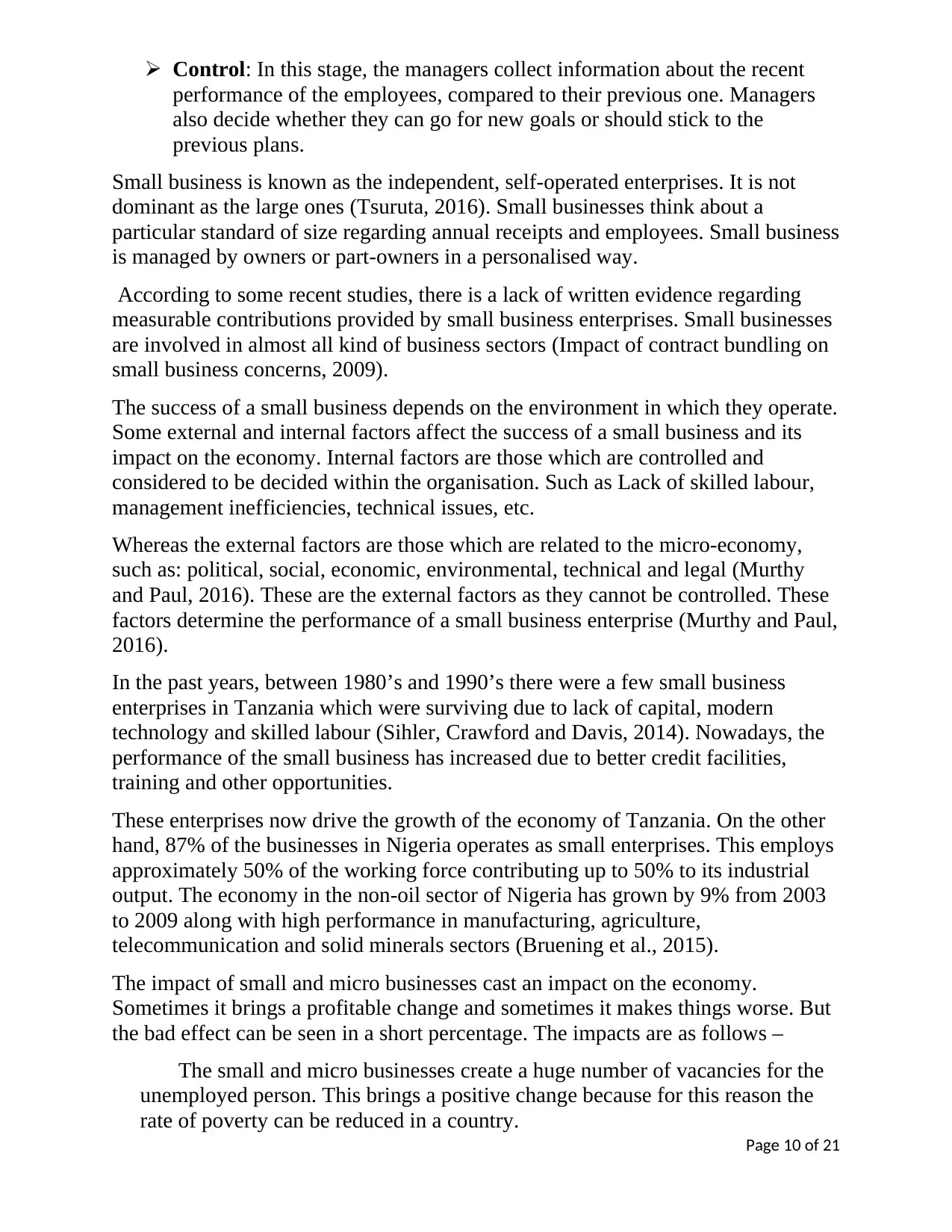
Control: In this stage, the managers collect information about the recent
performance of the employees, compared to their previous one. Managers
also decide whether they can go for new goals or should stick to the
previous plans.
Small business is known as the independent, self-operated enterprises. It is not
dominant as the large ones (Tsuruta, 2016). Small businesses think about a
particular standard of size regarding annual receipts and employees. Small business
is managed by owners or part-owners in a personalised way.
According to some recent studies, there is a lack of written evidence regarding
measurable contributions provided by small business enterprises. Small businesses
are involved in almost all kind of business sectors (Impact of contract bundling on
small business concerns, 2009).
The success of a small business depends on the environment in which they operate.
Some external and internal factors affect the success of a small business and its
impact on the economy. Internal factors are those which are controlled and
considered to be decided within the organisation. Such as Lack of skilled labour,
management inefficiencies, technical issues, etc.
Whereas the external factors are those which are related to the micro-economy,
such as: political, social, economic, environmental, technical and legal (Murthy
and Paul, 2016). These are the external factors as they cannot be controlled. These
factors determine the performance of a small business enterprise (Murthy and Paul,
2016).
In the past years, between 1980’s and 1990’s there were a few small business
enterprises in Tanzania which were surviving due to lack of capital, modern
technology and skilled labour (Sihler, Crawford and Davis, 2014). Nowadays, the
performance of the small business has increased due to better credit facilities,
training and other opportunities.
These enterprises now drive the growth of the economy of Tanzania. On the other
hand, 87% of the businesses in Nigeria operates as small enterprises. This employs
approximately 50% of the working force contributing up to 50% to its industrial
output. The economy in the non-oil sector of Nigeria has grown by 9% from 2003
to 2009 along with high performance in manufacturing, agriculture,
telecommunication and solid minerals sectors (Bruening et al., 2015).
The impact of small and micro businesses cast an impact on the economy.
Sometimes it brings a profitable change and sometimes it makes things worse. But
the bad effect can be seen in a short percentage. The impacts are as follows –
The small and micro businesses create a huge number of vacancies for the
unemployed person. This brings a positive change because for this reason the
rate of poverty can be reduced in a country.
Page 10 of 21
performance of the employees, compared to their previous one. Managers
also decide whether they can go for new goals or should stick to the
previous plans.
Small business is known as the independent, self-operated enterprises. It is not
dominant as the large ones (Tsuruta, 2016). Small businesses think about a
particular standard of size regarding annual receipts and employees. Small business
is managed by owners or part-owners in a personalised way.
According to some recent studies, there is a lack of written evidence regarding
measurable contributions provided by small business enterprises. Small businesses
are involved in almost all kind of business sectors (Impact of contract bundling on
small business concerns, 2009).
The success of a small business depends on the environment in which they operate.
Some external and internal factors affect the success of a small business and its
impact on the economy. Internal factors are those which are controlled and
considered to be decided within the organisation. Such as Lack of skilled labour,
management inefficiencies, technical issues, etc.
Whereas the external factors are those which are related to the micro-economy,
such as: political, social, economic, environmental, technical and legal (Murthy
and Paul, 2016). These are the external factors as they cannot be controlled. These
factors determine the performance of a small business enterprise (Murthy and Paul,
2016).
In the past years, between 1980’s and 1990’s there were a few small business
enterprises in Tanzania which were surviving due to lack of capital, modern
technology and skilled labour (Sihler, Crawford and Davis, 2014). Nowadays, the
performance of the small business has increased due to better credit facilities,
training and other opportunities.
These enterprises now drive the growth of the economy of Tanzania. On the other
hand, 87% of the businesses in Nigeria operates as small enterprises. This employs
approximately 50% of the working force contributing up to 50% to its industrial
output. The economy in the non-oil sector of Nigeria has grown by 9% from 2003
to 2009 along with high performance in manufacturing, agriculture,
telecommunication and solid minerals sectors (Bruening et al., 2015).
The impact of small and micro businesses cast an impact on the economy.
Sometimes it brings a profitable change and sometimes it makes things worse. But
the bad effect can be seen in a short percentage. The impacts are as follows –
The small and micro businesses create a huge number of vacancies for the
unemployed person. This brings a positive change because for this reason the
rate of poverty can be reduced in a country.
Page 10 of 21
Paraphrase This Document
Need a fresh take? Get an instant paraphrase of this document with our AI Paraphraser
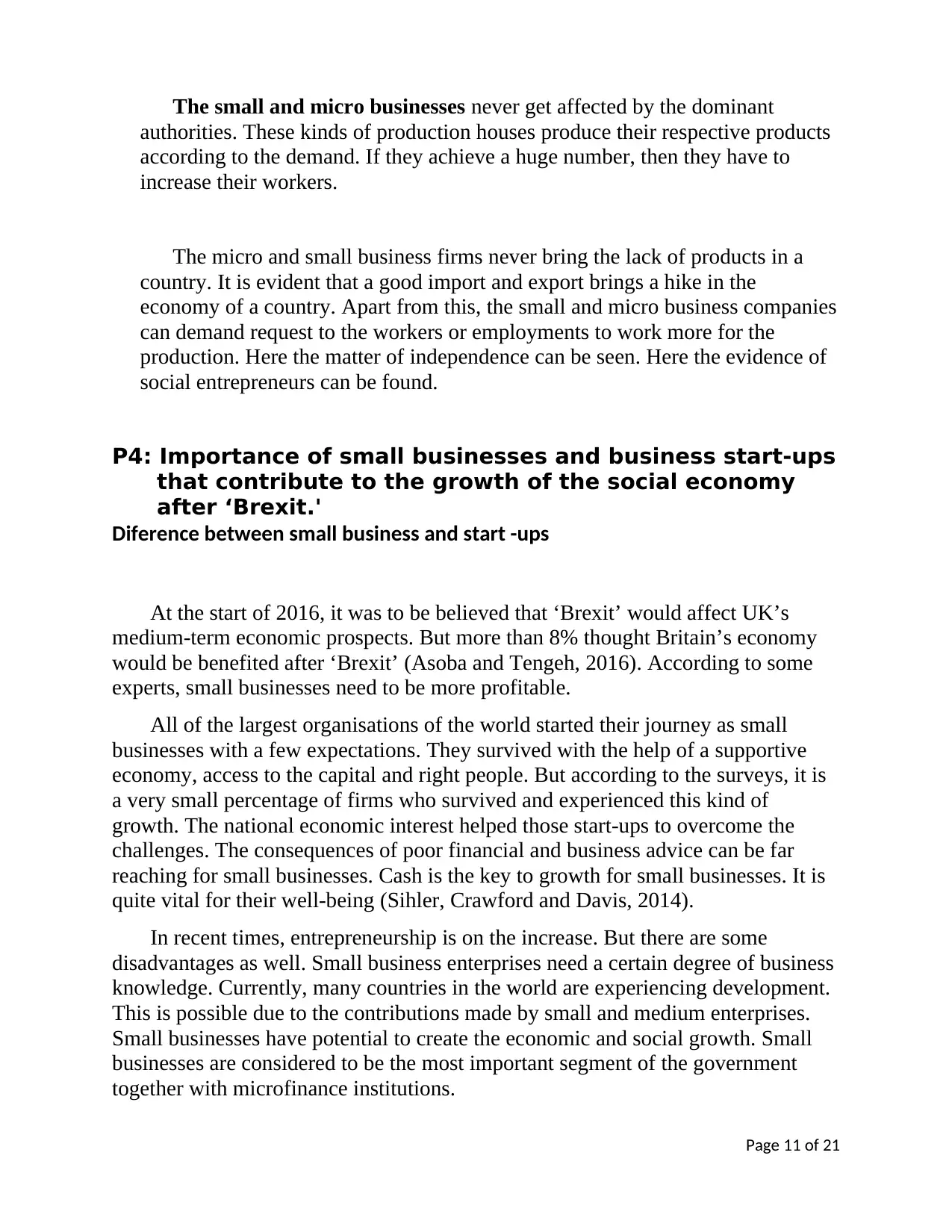
The small and micro businesses never get affected by the dominant
authorities. These kinds of production houses produce their respective products
according to the demand. If they achieve a huge number, then they have to
increase their workers.
The micro and small business firms never bring the lack of products in a
country. It is evident that a good import and export brings a hike in the
economy of a country. Apart from this, the small and micro business companies
can demand request to the workers or employments to work more for the
production. Here the matter of independence can be seen. Here the evidence of
social entrepreneurs can be found.
P4: Importance of small businesses and business start-ups
that contribute to the growth of the social economy
after ‘Brexit.'
Diference between small business and start -ups
At the start of 2016, it was to be believed that ‘Brexit’ would affect UK’s
medium-term economic prospects. But more than 8% thought Britain’s economy
would be benefited after ‘Brexit’ (Asoba and Tengeh, 2016). According to some
experts, small businesses need to be more profitable.
All of the largest organisations of the world started their journey as small
businesses with a few expectations. They survived with the help of a supportive
economy, access to the capital and right people. But according to the surveys, it is
a very small percentage of firms who survived and experienced this kind of
growth. The national economic interest helped those start-ups to overcome the
challenges. The consequences of poor financial and business advice can be far
reaching for small businesses. Cash is the key to growth for small businesses. It is
quite vital for their well-being (Sihler, Crawford and Davis, 2014).
In recent times, entrepreneurship is on the increase. But there are some
disadvantages as well. Small business enterprises need a certain degree of business
knowledge. Currently, many countries in the world are experiencing development.
This is possible due to the contributions made by small and medium enterprises.
Small businesses have potential to create the economic and social growth. Small
businesses are considered to be the most important segment of the government
together with microfinance institutions.
Page 11 of 21
authorities. These kinds of production houses produce their respective products
according to the demand. If they achieve a huge number, then they have to
increase their workers.
The micro and small business firms never bring the lack of products in a
country. It is evident that a good import and export brings a hike in the
economy of a country. Apart from this, the small and micro business companies
can demand request to the workers or employments to work more for the
production. Here the matter of independence can be seen. Here the evidence of
social entrepreneurs can be found.
P4: Importance of small businesses and business start-ups
that contribute to the growth of the social economy
after ‘Brexit.'
Diference between small business and start -ups
At the start of 2016, it was to be believed that ‘Brexit’ would affect UK’s
medium-term economic prospects. But more than 8% thought Britain’s economy
would be benefited after ‘Brexit’ (Asoba and Tengeh, 2016). According to some
experts, small businesses need to be more profitable.
All of the largest organisations of the world started their journey as small
businesses with a few expectations. They survived with the help of a supportive
economy, access to the capital and right people. But according to the surveys, it is
a very small percentage of firms who survived and experienced this kind of
growth. The national economic interest helped those start-ups to overcome the
challenges. The consequences of poor financial and business advice can be far
reaching for small businesses. Cash is the key to growth for small businesses. It is
quite vital for their well-being (Sihler, Crawford and Davis, 2014).
In recent times, entrepreneurship is on the increase. But there are some
disadvantages as well. Small business enterprises need a certain degree of business
knowledge. Currently, many countries in the world are experiencing development.
This is possible due to the contributions made by small and medium enterprises.
Small businesses have potential to create the economic and social growth. Small
businesses are considered to be the most important segment of the government
together with microfinance institutions.
Page 11 of 21
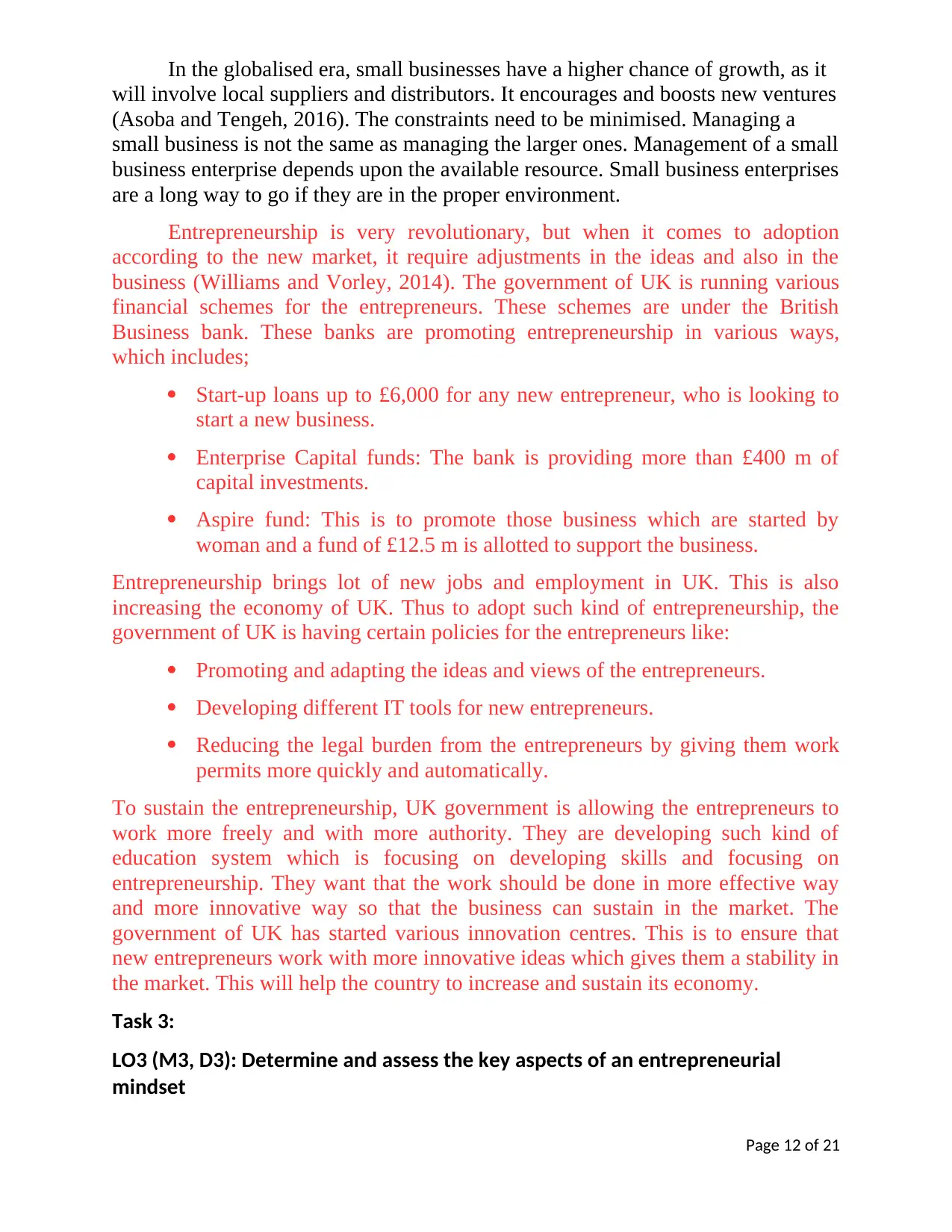
In the globalised era, small businesses have a higher chance of growth, as it
will involve local suppliers and distributors. It encourages and boosts new ventures
(Asoba and Tengeh, 2016). The constraints need to be minimised. Managing a
small business is not the same as managing the larger ones. Management of a small
business enterprise depends upon the available resource. Small business enterprises
are a long way to go if they are in the proper environment.
Entrepreneurship is very revolutionary, but when it comes to adoption
according to the new market, it require adjustments in the ideas and also in the
business (Williams and Vorley, 2014). The government of UK is running various
financial schemes for the entrepreneurs. These schemes are under the British
Business bank. These banks are promoting entrepreneurship in various ways,
which includes;
Start-up loans up to £6,000 for any new entrepreneur, who is looking to
start a new business.
Enterprise Capital funds: The bank is providing more than £400 m of
capital investments.
Aspire fund: This is to promote those business which are started by
woman and a fund of £12.5 m is allotted to support the business.
Entrepreneurship brings lot of new jobs and employment in UK. This is also
increasing the economy of UK. Thus to adopt such kind of entrepreneurship, the
government of UK is having certain policies for the entrepreneurs like:
Promoting and adapting the ideas and views of the entrepreneurs.
Developing different IT tools for new entrepreneurs.
Reducing the legal burden from the entrepreneurs by giving them work
permits more quickly and automatically.
To sustain the entrepreneurship, UK government is allowing the entrepreneurs to
work more freely and with more authority. They are developing such kind of
education system which is focusing on developing skills and focusing on
entrepreneurship. They want that the work should be done in more effective way
and more innovative way so that the business can sustain in the market. The
government of UK has started various innovation centres. This is to ensure that
new entrepreneurs work with more innovative ideas which gives them a stability in
the market. This will help the country to increase and sustain its economy.
Task 3:
LO3 (M3, D3): Determine and assess the key aspects of an entrepreneurial
mindset
Page 12 of 21
will involve local suppliers and distributors. It encourages and boosts new ventures
(Asoba and Tengeh, 2016). The constraints need to be minimised. Managing a
small business is not the same as managing the larger ones. Management of a small
business enterprise depends upon the available resource. Small business enterprises
are a long way to go if they are in the proper environment.
Entrepreneurship is very revolutionary, but when it comes to adoption
according to the new market, it require adjustments in the ideas and also in the
business (Williams and Vorley, 2014). The government of UK is running various
financial schemes for the entrepreneurs. These schemes are under the British
Business bank. These banks are promoting entrepreneurship in various ways,
which includes;
Start-up loans up to £6,000 for any new entrepreneur, who is looking to
start a new business.
Enterprise Capital funds: The bank is providing more than £400 m of
capital investments.
Aspire fund: This is to promote those business which are started by
woman and a fund of £12.5 m is allotted to support the business.
Entrepreneurship brings lot of new jobs and employment in UK. This is also
increasing the economy of UK. Thus to adopt such kind of entrepreneurship, the
government of UK is having certain policies for the entrepreneurs like:
Promoting and adapting the ideas and views of the entrepreneurs.
Developing different IT tools for new entrepreneurs.
Reducing the legal burden from the entrepreneurs by giving them work
permits more quickly and automatically.
To sustain the entrepreneurship, UK government is allowing the entrepreneurs to
work more freely and with more authority. They are developing such kind of
education system which is focusing on developing skills and focusing on
entrepreneurship. They want that the work should be done in more effective way
and more innovative way so that the business can sustain in the market. The
government of UK has started various innovation centres. This is to ensure that
new entrepreneurs work with more innovative ideas which gives them a stability in
the market. This will help the country to increase and sustain its economy.
Task 3:
LO3 (M3, D3): Determine and assess the key aspects of an entrepreneurial
mindset
Page 12 of 21
⊘ This is a preview!⊘
Do you want full access?
Subscribe today to unlock all pages.

Trusted by 1+ million students worldwide
1 out of 21
Related Documents
Your All-in-One AI-Powered Toolkit for Academic Success.
+13062052269
info@desklib.com
Available 24*7 on WhatsApp / Email
![[object Object]](/_next/static/media/star-bottom.7253800d.svg)
Unlock your academic potential
Copyright © 2020–2026 A2Z Services. All Rights Reserved. Developed and managed by ZUCOL.




